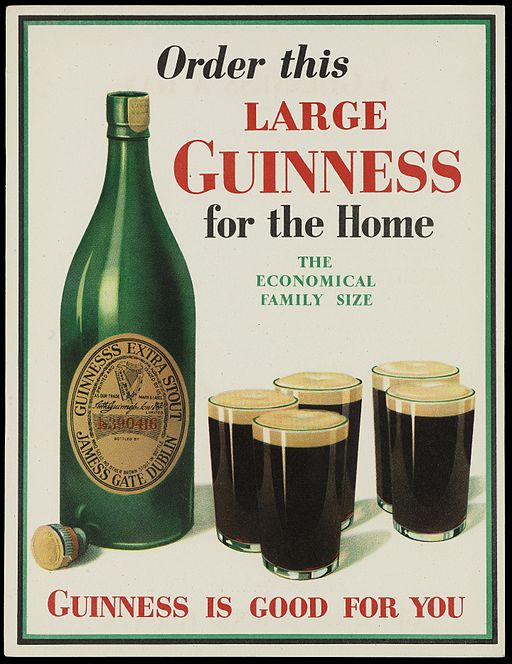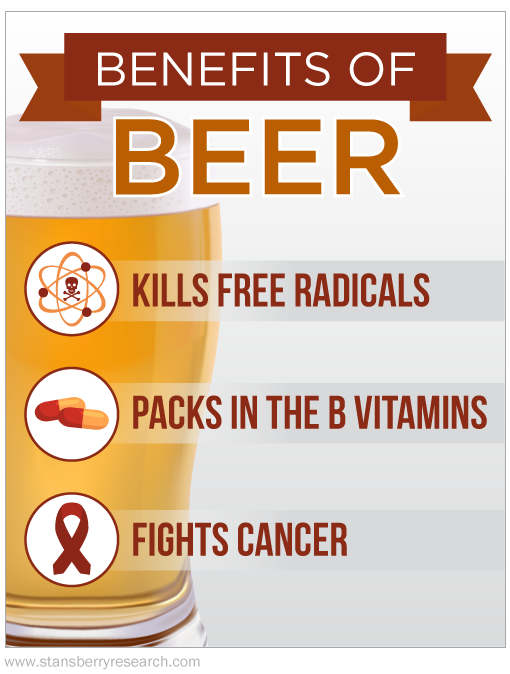You've probably seen a sign like this in your local Irish pub... Guinness is good for you.
Image from Wellcome Trust
The 1920s-era slogan worked well – the popular beer maker reached out to doctors around the U.K., asking them to submit testimonials about the drink.
This was more than just a marketing gimmick. It turns out Guinness really is good for you.
Many more recent studies have pointed to the virtues of beer (not just Guinness), such as...
- Reduced risk of diabetes
- Prevents cataracts
- Lowered blood pressure
- Improved immune responses
- Reduced risk of kidney stones
But as we pointed out in a recent Q&A, most of these are correlation studies.
Correlation studies mean that two factors – for example, beer drinking and lower blood pressure – happen at the same time. When you drink a beer, your blood pressure decreases. Two beers, and it drops a bit more. (Of course, the "Goldilocks rule" applies too. You can have too much of a good thing. You need to stop at some point before the damage to your health outweighs the benefits... For most adult men, that's around two drinks in an evening.)
And although many of these correlation studies are strong in size and statistical analysis, we wanted to dig deeper and find some cause-and-effect studies for you, also known as "mechanism of action" (or "MOA") studies. So here are some reasons beer is good for you...
1. Beer kills "free radicals" in blood plasma.
Beer, like coffee and wine, contains antioxidants called polyphenols. Polyphenols fight off reactive molecules called "free radicals" that trigger inflammation and lead to a host of diseases... from heart disease to dementia.
For example, a few years ago researchers from Israel carefully measured the effects of beer polyphenols on blood plasma – that's the salty, liquid part of the blood that carries the red and white blood cells. They saw that beer directly increased the antioxidant activity within the plasma. That means the antioxidants fought free radicals more effectively.
Another study from Italy showed similar results testing regular beer against straight ethanol and nonalcoholic beer. Phenolic acids, including two often found in beer (sinapic and syringic acids) significantly increased in the blood plasma of those who drank full-alcohol beer. Phenolic acids are another type of polyphenol known to fight inflammation. That suggests the combination of ethanol and polyphenols achieved the most benefit.
2. Beer packs in the B vitamins.
Beer contains vitamin B3, which lowers your risk of diabetes, cataracts, and some skin cancers, and it's essential for heart health. It also serves as a building block for nicotinamide adenine dinucleotide (NAD), which helps your body break down carbohydrates, proteins, and fat.
One of the ways B3 works is that it boosts the ability of a molecule called p53. This tiny molecule helps shut down DNA-damaged cells... cells that can start dividing too much and lead to cancer.
Beer also contains B6, which might play a protective role for certain nerves. Your body needs B6 in order to make serotonin, a key neurotransmitter for many parts of your brain.
3. Beer fights cancer.
Sinapic and syringic acids can also directly stop the growth of cancer cells... as can another compound in beer getting a lot of attention in cancer research – xanthohumol.
This chemical directly boosts the enzymes responsible for breaking down cancer cells. It's available in very small quantities in your normal beer, but there's talk of brewers adding in larger amounts to boost beer's benefits.
But beer also helps fight cancer in a more unusual way... Marinating your meat in beer significantly reduces the amount of cancer-causing polycyclic aromatic hydrocarbons (PAHs) that come from smoke that rises up when fat drips off into the flames.
The smoke sticks on the meat, creating the grilled flavor, but also trapping the PAHs in the food. Too many PAHs overwhelm the body and can trigger cancers and even damage skin and lungs.
Researchers tested meats without a marinade against meats in one of three beer-based marinades. The light-beer marinades, including one without alcohol, led to about 19% fewer PAHs than the non-marinated meat. But the best was the black-beer-marinated meat, which had 53% fewer PAHs.
Remember: The darker the beer, the higher the level of antioxidants. To us, that's even more reason to enjoy a good, dark beer... After I finished my first marathon, I wanted a bratwurst and a pint of Guinness. And even if you don't like to drink at all, we recommend marinating your meats in a dark beer to enjoy the antioxidant powers.
And what about those Irish doctors? Were they ahead of their time? Well, yes and no.
Some doctors at the time recommended Guinness for people with low iron in their blood. The thick, dark stout had higher levels of iron than other beers. But a pint of Guinness only contains a small percent of your recommended daily value of iron.
So their advice was healthy... but not for the reasons they thought.
[optin_form id="161"]
What We're Reading...
- Check out more on the beer versus wine showdown with this helpful infographic.
- Does your beer preference match your age? These graphs show who likes stouts, lambics, and other types of beer.
- Something different: Four of Britain's best photographers have been sharing breathtaking views of Ireland. See their best right here by clicking on "View Gallery."


